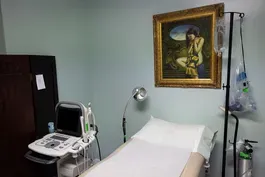
New HIV shows promise in preventing infections in trials
Clip: 6/26/2024 | 6m 24sVideo has Closed Captions
New HIV drug taken twice a year shows promise in preventing infections in trials
The long fight against HIV/AIDS may get a potent new weapon. A new drug, taken by injection twice a year, shows great promise in preventing new HIV infections and would ease the treatment process since patients currently have to take daily medication. It could have far-reaching impacts, especially in lower-income countries that are facing rising new infection rates. William Brangham reports.
Problems with Closed Captions? Closed Captioning Feedback
Problems with Closed Captions? Closed Captioning Feedback
Major corporate funding for the PBS News Hour is provided by BDO, BNSF, Consumer Cellular, American Cruise Lines, and Raymond James. Funding for the PBS NewsHour Weekend is provided by...

New HIV shows promise in preventing infections in trials
Clip: 6/26/2024 | 6m 24sVideo has Closed Captions
The long fight against HIV/AIDS may get a potent new weapon. A new drug, taken by injection twice a year, shows great promise in preventing new HIV infections and would ease the treatment process since patients currently have to take daily medication. It could have far-reaching impacts, especially in lower-income countries that are facing rising new infection rates. William Brangham reports.
Problems with Closed Captions? Closed Captioning Feedback
How to Watch PBS News Hour
PBS News Hour is available to stream on pbs.org and the free PBS App, available on iPhone, Apple TV, Android TV, Android smartphones, Amazon Fire TV, Amazon Fire Tablet, Roku, Samsung Smart TV, and Vizio.
Providing Support for PBS.org
Learn Moreabout PBS online sponsorshipGEOFF BENNETT: The long fight against HIV/AIDS may get a powerful new weapon.
A new drug taken by injection only twice a year shows great promise in preventing new HIV infections.
That could have far-reaching impacts, especially in lower-income countries that are facing rising infection rates.
William Brangham has the details.
WILLIAM BRANGHAM: That's right.
This drug is called lenacapavir.
And it is made by the drugmaker Gilead, which recently said that in a clinical trial of 2,000 patients in South Africa and Uganda, not one person taking the drug was infected with HIV.
So if this drug pans out as hoped, what would that mean for global HIV care?
To understand that, we turn to one of the world's leading experts in HIV treatment and prevention.
Salim Abdool Karim the head of CAPRISA, one of South Africa's top HIV/AIDS research centers and which helped run this study.
Salim Abdool Karim, so nice to have you back on the program.
As I mentioned, this drug is not yet approved for use in the marketplace, but let's say these results hold up.
What would this mean?
How potent a tool would this be in the fight against HIV?
SALIM ABDOOL KARIM, Director, CAPRISA: Great to be here with you, William.
Well, in my 40 years of doing AIDS research, I have never seen a result like this.
Absolutely amazing to see a drug like this that provides 100 percent protection.
So when you look at a drug like this, and given that it's in a completely new class of antiretrovirals, we do not have circulating resistance to this drug.
And so we are seeing high levels of protection because it's not a drug that the virus has already been exposed to.
But its potential as a highly efficacious prevention mechanism is enormous.
Given that our goal is to try and end the AIDS pandemic by 2030, and this is ending it as a public health threat, we need to focus on the three key groups where HIV continues to be a major challenge.
And those three groups are men who have sex with men, in particular, younger men who have sex with men, injecting drug users, and, in Africa, young women.
Indeed, young women bear the brunt of the HIV pandemic in Africa.
And the study was undertaken in exactly that group.
And if we can get this drug rolled out to large numbers of high-risk women, we could make a huge dent on the pandemic.
WILLIAM BRANGHAM: But given that there is already a prevention pill, Truvada, or PrEP, as it is known, that people take every single day, why does this twice-a-year shot make such a difference?
SALIM ABDOOL KARIM: So, studies done with antiretrovirals taken as a daily tablet or daily pill have shown that we have a challenge in individuals maintaining the ongoing use of these drugs, what we refer to as adherence or compliance.
The big challenge you have is that the individuals taking the drug are well and healthy people.
They don't have HIV.
So, it requires an extra moral effort for them to be able to remember that every day that they are at risk of HIV and they need to remember to take their tablets.
It also places an onus of the individuals to go to the hospital to collect the medications at a regular interval.
And that becomes a high bar when we are dealing with people who are essentially well.
The difference now is that, basically, individuals who are at risk need to think about their risk of HIV twice a year, and they need to make the effort to go to a clinic or a hospital to get this injection just once every six months.
That sits a much lower bar.
And, therefore, we think we will have better adherence and will lead to a larger number of patients taking it up and maintaining their long-term use of this injectable.
WILLIAM BRANGHAM: In the U.S. and certain parts of the West, new HIV infections, certainly deaths from AIDS, have really dropped off people's radar.
I know that's not the case elsewhere in the country, certainly not where you are in South Africa.
Can you remind us the challenges you still face fighting this pandemic?
SALIM ABDOOL KARIM: Well, the problem was that COVID-19 literally came in with such gusto that it consumed all of the world's attention.
I think we're seeing that there's a lot of what I call fatigue, AIDS fatigue, people just tired of this problem.
They moved on mentally, physically.
And so the other pandemics that were occurring, they haven't gone away.
They remain with us.
And the three big pandemics are malaria, tuberculosis and HIV.
And of those, in terms of HIV, in places, in many countries in Africa, AIDS remains one of the biggest challenges.
In South Africa, it remains one of the top 10 causes of death.
If you take at a global level, just last year, there were in the region of around one-and-a-half-million new infections.
That's a lot of new infections still continuing at the global level.
But it's not just that we're seeing new infections occurring.
We continue to have a high number of deaths.
Around 700,000 deaths occurred last year.
So we have got to change that narrative.
We have got to slow down the spread of this virus.
And we have got to protect people from dying.
WILLIAM BRANGHAM: All right, Salim Abdool Karim, the head of CAPRISA in South Africa, it is always good to see you.
Thank you so much for being here.
SALIM ABDOOL KARIM: It's a pleasure.
Biden pardons veterans convicted under military gay sex ban
Video has Closed Captions
Clip: 6/26/2024 | 5m 43s | Biden pardons veterans convicted under military's former ban on gay sex (5m 43s)
The chances of a prisoner swap as Gershkovich's trial begins
Video has Closed Captions
Clip: 6/26/2024 | 9m 23s | As Gershkovich's trial begins, a look at the chances of a U.S.-Russia prisoner swap (9m 23s)
Christian communities face growing political divide
Video has Closed Captions
Clip: 6/26/2024 | 11m 48s | Christian communities face growing political divide as religious affiliation declines (11m 48s)
Draft opinion mistakenly posted by the Supreme Court
Video has Closed Captions
Clip: 6/26/2024 | 3m 37s | How a draft opinion on Idaho's abortion ban was mistakenly posted by the Supreme Court (3m 37s)
Experts provide insights on border situation ahead of debate
Video has Closed Captions
Clip: 6/26/2024 | 9m 27s | As immigration emerges as key election issue, experts provide insights on border situation (9m 27s)
Providing Support for PBS.org
Learn Moreabout PBS online sponsorshipSupport for PBS provided by:
Major corporate funding for the PBS News Hour is provided by BDO, BNSF, Consumer Cellular, American Cruise Lines, and Raymond James. Funding for the PBS NewsHour Weekend is provided by...
















